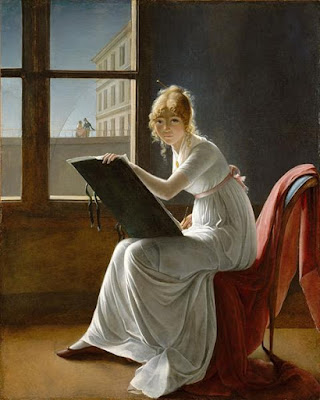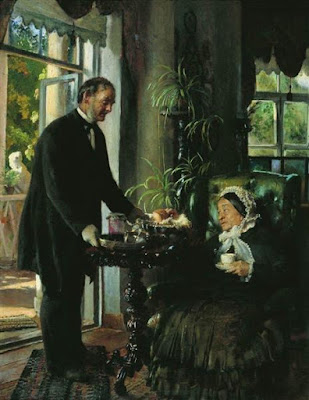 |
| Young Woman Drawing (1801) Maria-Denis Villers source Wikiart |
I can’t believe I have never read Kafka. So with this surprising fact in mind I dived into this short story for my Deal-Me-In Challenge. Perhaps I expected too much …
The narrator immediately makes the reader acquainted with his challenges with this “little woman”. She has complete contempt for him and his life, and his perceptions appear wrapped up in her treatment of him. However, he reveals that she is almost a stranger to him, yet nevertheless, she disparages and demeans him incessantly and with impunity. She even goes as far as to ellict people’s compassion for her struggles to tolerate him, not by revealing them, but by exhibiting a demeanour of quiet suffering.
 |
| Landlady (1886) Konstantin Makovsky source Wikiart |
I did not understand this story at all, nor did I find it the slightest bit compelling. Given that the narrator reveals that the woman is nearly a stranger to him, one cannot even imagine her as a wife or sister or mother and so there it ends. How can one be interested in a relationship that is not one, nor experience annoyance that is based on nothing tangible? Apparently Kafka based the little woman on his landlady when he lived in Berlin-Steglitz.
In spite of this less than inspiring story, I am looking forward to reading more of Kafka with hopefully a different reaction to his works.
Next week, I’ll be reading the short story Le Horla by Guy Maupassant. I’ll attempt to read it in French but it’s rather long so I’ll have to see if my skills are up to it. Stay tuned …..
Week 2 – Deal Me In Challenge – Nine of Clubs




Ah, Kafka. Yeah, he's mind boggling. However, you may enjoy The Trial. It's a lot more of a plot, though also like a bad dream. Metamorphoses was also a bad dream. But sometimes bad dreams are intriguing.
kafka, yessss…. i've read some of his books and they all end up about the same way, imo… with the feeling that something is going on he doesn't want the reader to know about… i've also read books ON Kafka that come to the same conclusion, seemingly: that he was depressed, paranoid, autistic, manic depressive, schizoid, or… take your pick. on the other hand, there's something about him… that's rather attractive, that reflects in an original way, life as it sometimes appears to us, in our less conscious moments; or more conscious, maybe… anyway, something…
I've never read this one. Try Metamorphosis next time, maybe. I've read the Horla story though! I liked it. Creepy.
One thing this story is, is a German landlady joke, a common genre, but culturally specific.
More importantly, though, the narrator is nuts, a paranoid fantasist, an egomaniac. The story is about him, and his delusions. The little woman is incidental, although it is likely true that she does not approve of him or anything he does, given that she is a German landlady, and that is what they are famous for.
"if she heard that I had committed suicide she would fall into transports of rage" – now there is a good example of Kafka's humor.
Are you really looking to Kafka for inspiration? He mostly inspires alienation and dread, and laughter, among those, like Kafka, who find that kind of thing funny.
I read him for the first time last year – Metamorphosis. Also speed read The Penal Colony. Quite weird.
Ok…that is weird and I must say your synopsis makes me feel like I have not missed much by NEVER reading him. Though quiet a few folks have recommended The Trial. I think Tom's comment brought some sense into the plot or whatever you may call it, but I am still unsure if I want to read him.
Or – just ignore everything I said that was not about German landladies – there is only one person in the story, more or less sane but split, with the narrator as his Ego and the disapproving landlady as his Superego.
Sometimes Kafka benefits from an allegorical imagination.
My advice, really, is to forget this story and move to The Metamorphosis, a fable of great humanity and beauty.
I can tell that I'm going to have to approach him from a different mindset. First Dostoyevsky and now Kafka —- I'm really challenging myself! 🙂
Yes, from this little introduction, he appears to be another author who has a distance from his readers. I'll take your comments to heart and look much deeper with my next reading.
Metamorphosis would be my first choice. Hopefully this year, or failing that, The Trial.
I'm part way through The Horla and am thoroughly enjoying it. Nightmarish, yet intriguing!
Thank you so much for the further insights, Tom. I just felt impatience with this story, so it's helpful to have something else to grasp onto. Honestly, I was probably hoping to move from Dostoyevsky to something else a little more sane, or perhaps balanced is a better word, but I didn't find it in Kafka; in fact things became more bizarre. Now that I have a taste though, I'm prepared for next time.
Ooo, I haven't heard about The Penal Colony. The word weird and Kafka seems to go well together. I'm looking forward to Metamorphosis.
I don't think his works are long, so you won't be consuming much of your time if you do read him. I think that he's worth an attempt, probably with Metamorphosis. If I decide to read it later this year, I'll give you a shout. 😉
Ah, ego and superego …. I would have never thought of that.
Metamorphosis, it is then! 🙂
I remember being assigned "Metamorphosis" in high school and somewhat liking it at the time. I haven't read many of his other stories, but I do recall that the ones I have read aren't what could be called "feel good" stories. Hopefully DMI will deal you up a more pleasant story soon. 🙂
A fair warning from you and others and I promise that I will no longer expect anything light-hearted from Kafka. 😀
I've begun to read next week's story and, without revealing too much, it's been a very pleasant surprise!
Ah, Kafka is such hard work. Can't get into him at all either I'm afraid. Have vague plans of reading The Castle and re-reading The Trial…
Funny, it seems people either love him or …. not …… 😉 I will persevere but with less expectations. I am excited about Metamorphosis though.
Darn, it's a shame that your first reading of Kafka was so unpleasant. I admit that it took me a while to warm up to his style and a lot of his surrealist stories tend to go over my head but just to echo what others have said, "Metamorphosis" is fantastic and certainly worth reading. My personal favorite is "A Country Doctor" for its dramatic intensity and disturbing nightmarish vision. I'd be curious to know what you think of this one.
Hopefully your next pick for the DMI challenge is a lot more enjoyable! 🙂
Well, I'll keep trying, I promise! 🙂 Honestly, I'm not a huge fan of short stories (although Maupassant is changing my mind), so I won't judge Kafka completely with this one. I'll just be more careful. 🙂 A Country Doctor sounds great. I always like those kinds of stories.
Few writers are as great as Kafka. I am not here to tell you what you should or shouldn’t do; but if you (after convincing yourself of what true writing is), intend to read true writers, I would definitely suggest to read Kafka. I see on the comments some insults towards Kafka, do not pay attention to any type of discouragement you may encounter; it is time wrongly distributed. Weird? Can anyone define that word? I don’t think it is possible. But if we stubbornly set ourselves to do so, we will end up by accepting that nothing is weirder than the planet itself. “There’s no such thing as a moral or immoral book, books are well written or badly written, that is all” –Wilde. And Kafka certainly knows how to write.
You are certainly a lover of Kafka and I appreciate your comment. I didn't see any insults to Kafka, only other people's opinions and most of them were positive and encouraging. I'll definitely be reading more Kafka in the future. I think his novels (or novellas) will be much more interesting than this short story. Thanks again for stopping by!